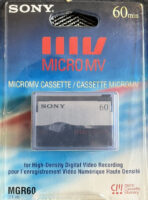The following article is excerpted from the Professional Video Producer home study course.
By Hal Landen
Updated December 2021
According to the U.S. Internal Revenue Service, video equipment, books, magazines and a host of other expenditures including the items in our catalog may be deductible as business expenses. You must, however, own a video business, but even a small, part-time video business operated out of your home may qualify. To be considered a business you must, among other things, show a profit three out of five years in a row. If not, it’s considered a hobby and the expenses of a hobby are not deductible. The “three out of five” is a rule of thumb. As such it is a gray area so check with your accountant if there’s any question.
If you maintain an office in your home and meet certain requirements, you may also qualify to deduct a percentage of your home expenses including: interest paid on a mortgage, electricity, telephone, garbage pickup, possibly even cable TV. These video business tax deductions are worth a lot so study this article and the IRS site carefully.
BUT I AM NOT AN ACCOUNTANT. I urge you to seek the professional advice of a qualified accountant. Ask your business friends for recommendations. A good accountant will nearly always save you much more than their fee, especially if you’re well-organized and have kept all receipts and canceled checks. The accounting fees can be as little as $150 – $200. And this fee is itself deductible. It goes on Schedule C, for the Profit or Loss from a Business. The category is Professional and Legal services.
Interest paid on a credit card is not normally deductible for individuals with regular jobs. But if you own a video business and use a credit card to buy equipment that’s used in your business, the interest on that card may now be deductible. And the cost of that equipment is, of course, deductible. Video equipment is usually depreciated over a period of years. You can expense (write it off in one year) equipment that costs $250,000 or less. If you want to deduct equipment, you must purchase it before the end of the year. This is December 31 for most people.
This figure changes every year, sometimes dramatically, so you will want to check the IRS site.
An accountant will help you determine whether it is in your interest to deduct this expense as one lump sum or depreciate it and deduct it over several years. If you charge equipment on your credit card before December 31st, you can write that expense off in this calendar year even though you won’t make payments till the new year.
Business mileage on your car is also a legitimate deduction that can add up quickly. Starting Jan 2021 the rate is 56 cents a mile for all business miles. This figure changes most every year. Check the IRS site.
Owning a small business can be a tax bonanza. Some people with full-time jobs have started part-time businesses just for the deductions. Deciding to turn your video hobby into a business so that you can reap the tax benefits does, however, carry some responsibilities. Chief among them is the need to keep receipts for everything. Whether it’s a cash receipt, a canceled check, or a credit card purchase, you’ll want to keep these receipts and records well-organized.
Each receipt needs some kind of notation for what the expense was. A year from now when you do this year’s taxes, you may not remember what a particular receipt was. If not, you may have lost a deduction.
It’s fine to keep all these records in a shoe box, but before you visit your accountant you’ll want to add up all the expenses in each category. Otherwise you’ll be paying your accountant for work you should have done yourself.
Some of the categories you’ll want to consider:
advertising
car mileage
telephone
office expenses
Internet service providers
interest
repairs and maintenance
supplies
utilities
equipment purchases
professional books and magazines
hired help
postage
The first time you go to an accountant, you’ll probably have a lot of questions. And you should. You’ll want to know what’s deductible and what’s not. The following year will be much easier because you’ll know what numbers your accountant needs to help you minimize your tax obligations.
A smart accountant will also help you avoid tax problems which can arise years after you file a return. If you have large deductions for things like meals and entertainment, you are sending a red flag to the IRS computers. That red flag says AUDIT THIS RETURN. Even if all of your records are in perfect order and completely within the law, an audit is not a good way to spend a day. And if you had not hired an accountant before, you would be foolhardy not to hire some help for an audit. Most accountants do not charge for representing you at an audit when they were the ones doing your taxes.
I’ve been audited twice. In both cases, I didn’t have to pay the IRS any money. Believe it or not, the IRS actually paid me because the audit proved that I had overpaid my taxes by a small amount. If the audit found you had underpaid your taxes, you can expect more audits. This is another benefit of having a smart accountant and following his or her advice.
IRS rules change often. Things like car mileage allowances used to increase every year or so because the IRS determines that the cost of running a car has changed.
This is another reason an accountant is such a great investment. A big part of your accountant’s job is keep up with changes in the tax law and help you use the tax laws to your advantage.
The rules for deducting a home office have improved so more independent producers will be entitled to the home office deduction. There are also tax credits for energy-saving things like insulation and other energy saving devices that you may qualify for.
Read this Article from the IRS Web Site
Do You Have a Deductible Home Office?
Whether you are self-employed or an employee, if you use a portion of your home for business purposes, you may be able to take a home office deduction, according to the IRS.
You can deduct certain expenses if your home office is the principal place where your trade or business is conducted or where you meet and deal with clients or patients in the course of your business. If you use a separate structure not attached to your home for an exclusive and regular part of your business, you can deduct expenses related to it.
Your home office will qualify as your principal place of business if you use it exclusively and regularly for the administrative or management activities associated with your trade or business. There must also be no other fixed place where you can conduct these administrative or management activities. If you use both your home and other locations regularly in your business, you must determine which location is your principal place of business, based on the relative importance of the activities performed at each location.
If you are an employee, you have additional requirements to meet. You cannot take the home office deduction unless the business use of your home is for the convenience of your employer. Also, you cannot take deductions for space you are renting to your employer.
Generally, the amount you can deduct depends on the percentage of your home used for business. This percentage is found by measuring the square footage of living space in your house and then measuring the square footage that is used exclusively as a home office. Your deduction will be limited if your gross income from your business is less than your total business expenses.
Expenses that you can deduct for business use of the home may include the business portion of real estate taxes, mortgage interest, rent, utilities, insurance, depreciation, painting and repairs. You may not deduct expenses for lawn care or those related only to rooms not used for business.
There are special rules for qualified day care providers and for persons storing business inventory or product samples. For more information, see Publication 587, Business Use of Your Home.
If you are self-employed, use Form 8829 to figure your home office deduction and report those deductions on line 30 of Schedule C, Form 1040. Employees can use the worksheet in Pub. 587 to figure their allowable expenses and claim them as a miscellaneous itemized deduction on Schedule A, Form 1040.
To be on the safe side, you may also want to review new Publication 4035, Home-Based Business Tax Avoidance Schemes, which describes schemes that claim to offer tax relief but which actually result in illegal tax avoidance.
For the latest IRS information on Home Office Deductions, please see the Home Office Deduction page on the IRS web site.
End of The IRS Article
Even though the above article is directly from the IRS, be cautious in applying any of the information without the advice of a CPA. It could be a very expensive mistake to find five years from now that all those deductions you had taken would have to be repaid on five years of taxes! Don’t take chances.
Aside from keeping complete records of your income and expenses, another obligation you’ll face is self-employment tax. If your sole income is from a video business, you probably don’t have any taxes withheld from your income. You will owe self-employment taxes. This is one obligation your accountant should not try to minimize.
This self-employment tax money goes into your Social Security account. For many people Social Security is an important retirement income. If you only put a little into this account, you’ll only get a little out.
Even if you just throw all your receipts and records into a shoebox, it’s a good idea to spend a few hours at the end of the year to categorize them and total each category. It’s also wise to meet with your accountant early in the new year. Don’t wait for April 14th. This way you’ll have a head start on your tax strategies and if you owe taxes, this early start gives you a chance to save before your taxes are due on April 15th.
* * *
Hal Landen has been self-employed for many years. He is the author of TAX DEDUCTIBLE items such as Professional Video Producer as well as numerous other information products in the VideoUniversity Store.






Thanks for sharing this article. I think that you are right. I will do everything that you said I can save money earlier enough before 14th of April. This article is definitely informative and helpful.